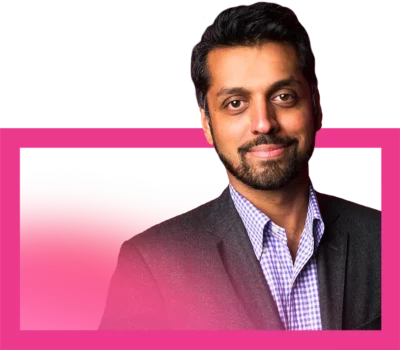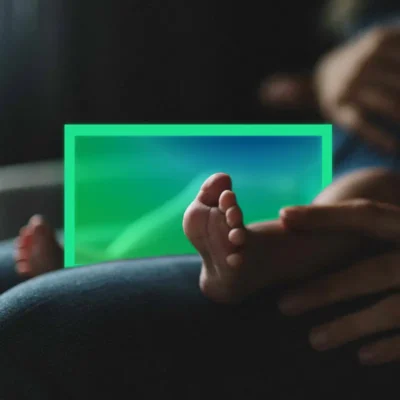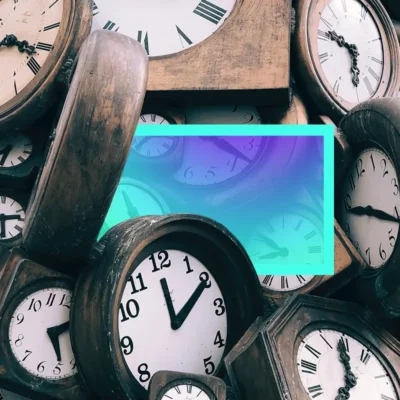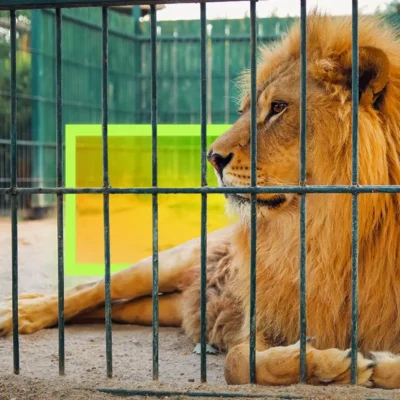Have faith, but tie your camel first
It’s early morning. A hotel room. Wajahat Ali, playwright and author, is traveling for work when he gets a call from his wife – she’s sobbing, panicked, heartbroken. Their tiny daughter, Nusayba, has been diagnosed with Stage IV cancer. And time stops. What can he do? Rage. Despair. Sob. Fight. Then … let go. Waj shares the story of how his young daughter’s fight with cancer taught him to strike a delicate balance between faith and action, between exhausting his efforts and accepting the outcome.
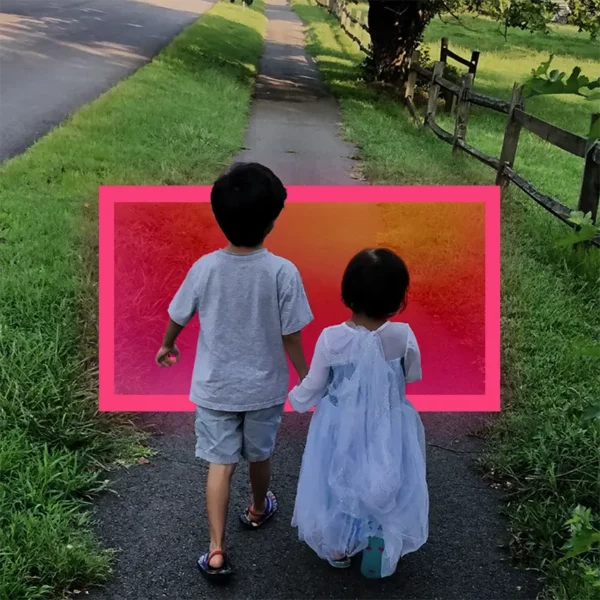
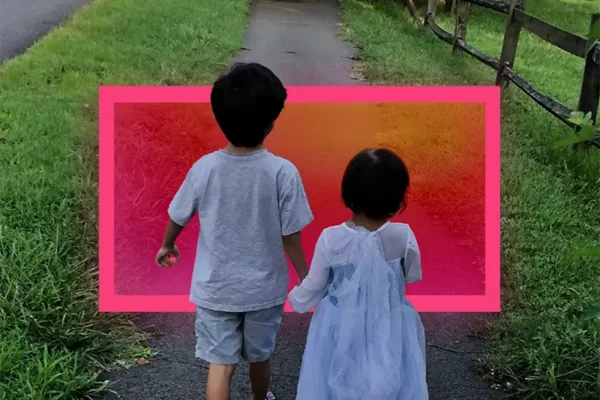
Table of Contents:
Transcript:
Have faith, but tie your camel first
WAJAHAT ALI: I want to absorb Nusayba’s pain. I want to believe it’s in my power to fix things. But of course, I’m not a doctor – much to my South Asian parents’ chagrin – and, to be honest, I don’t even have health insurance – my wife does, though, thank God. All I can do is try to make the ride easier for everyone around me. My daughter, my son, my wife, my parents.
There’s an Islamic proverb: Trust in God, but tie your camel first. Which means: exhaust all your efforts, do everything humanly possible and then let go of the reins. This is the mindset I force myself to assume. I owe it to my daughter to do everything I can, and only then surrender. “Okay,” I say out loud. “This is happening. And we will do whatever it takes. If we go down, we go down swinging. We go down swinging together. So Inshallah, let’s fight.”
ROHAN GUNATILLAKE: Wajahat Ali is a writer and public speaker whose perspectives on political, social, and cultural – in particular multicultural – issues are always shared with a balance of humor, vulnerability, and striking insight.
In today’s Meditative Story, Waj invites us on his family’s difficult but hopeful journey through the illness of his young daughter, an ordeal that forces Waj to strike a delicate balance between faith and action, between exhausting his efforts, and surrendering to the outcome. It is sensitive, challenging stuff, so be gentle upon yourself as you listen.
In this series, we combine immersive first-person stories and breathtaking music with the science-backed benefits of mindfulness practice. From WaitWhat and Thrive Global, this is Meditative Story. I’m Rohan, and I’ll be your guide. The body relaxed. The body breathing. Your senses open. Your mind open. Meeting the world.
ALI: I wake up before the sound of my alarm to my phone ringing. I’m in Vancouver for work, alone in my hotel room. I hear the morning’s first birds. The sound is distinct but softened by the white noise of the hotel’s air conditioning. Daylight is just beginning to push its way in, seeping through the cracks of the curtains. I check the caller ID. It’s my wife.
Before I can even get the phone to my ear, I hear her sobbing, unable to get the words out. My wife is a doctor, very level-headed – both of us are. We are compatible that way. So to hear her so distraught isn’t just upsetting, it’s alarming. Something is terribly, dangerously wrong. She’s trying to explain but she can barely string together a coherent sentence.
“I found a bump on her stomach.” She’s talking about our little girl, Nusayba. “I took her to the hospital and they… they… they found bumps all over her liver. It’s not good,” she says, trying to catch her breath. “It’s not good.”
I ball my hand up into a fist and punch the pillow, yell ”No!” Instinctively, I offer a barter prayer: All right, God. My life for hers. Simple trade. Thirty-eight-year-old-man, two-year-old girl. Let’s do it.
I’m committed to the barter even though I know I’m not going to get an answer. But alone, in my room, I still say the prayer. It’s my way of trying to make sense of what is ultimately a cruel, senseless event. Why would a two-year-old girl get cancer?
There’s an Arabic word, waswasa. It refers to those sneaky whispers in your head. The little devil on your shoulder that gives you the absolute worst advice, often at those times you most need a level head. Once it begins, you go to a very dark place, very quickly. Like, the golem place. In an instant I mentally and spiritually prepare myself for everything to go wrong. What happens if she dies? This is me burying my daughter. This is me telling my in-laws she passed away. This is me telling my family in Pakistan. This is me imagining my life after burying my daughter. This is me pretending to be happy and normal for the sake of my son.
It’s a way of avoiding reality, burying my head in the sand. But just as soon as I think it, I rein it back in. So: How can I fight this? How does a person take on cancer? A father. How do I take control? A father is supposed to fix things. Like, that’s my job.
I want to absorb Nusayba’s pain. I want to believe it’s in my power to fix things. But of course, I’m not a doctor – much to my South Asian parents’ chagrin – and, to be honest, I don’t even have health insurance – my wife does, though, thank God. All I can do is try to make the ride easier for everyone around me. My daughter, my son, my wife, my parents.
There’s an Islamic proverb: Trust in God, but tie your camel first. Which means: exhaust all your efforts, do everything humanly possible and then let go of the reins. This is the mindset I force myself to assume. I owe it to my daughter to do everything I can, and only then surrender. “Okay,” I say out loud. “This is happening. And we will do whatever it takes. If we go down, we go down swinging. We go down swinging together. So Inshallah, let’s fight.”
GUNATILLAKE: This is happening. What is happening with you is happening. For Wajahat it is a conflicting messy mix of surrender, fight, bargaining, and acceptance. It’s ok if they are in conflict, but what emotions are here for you as you lean into what will happen next?
ALI: Nusayba is diagnosed with hepatoblastoma, a rare cancer that primarily affects children during the first three years of life. It’s stage 4.
Donors. We need a donor.
Among the viable donors is a friend of ours, who has volunteered without telling us. The doctors tell us her liver is a perfect match. For the first time in months we are ecstatic. “Are you 110% positive? For sure, this is happening? Have you done all the tests? Is it like confirmed?”
Yes. Yes. And yes. Pure joy. It is the exact opposite of how we felt in April when we found out. But four days before Nusayba’s liver transplant surgery, I get a call from Dr. Fishbein at Georgetown Medical Center. He is the expert in the field. He’s been doing this for 40 years. “We can’t do it,” he says. “I see a complication.”
I’m floored. An immediate reversal of our hope, a punch to the gut. Here is a situation over which we have no control. And so we allow ourselves, both my wife and I, for this day, to feel miserable, to sit in this moment and feel this pain. This frustration. This disappointment. But for one day only. One day and one night. At 4 am, lying in bed, turning over fitfully, I promise myself that when I wake up, I’m gonna shake it off and say bis-millah, and double our efforts.
What constructive role can I play in solving this?
In her poem “The Speed of Darkness,” Muriel Rukeyser writes: “The universe is made of stories, not atoms.”
Stories are how we understand each other, how we relate to one another, how we find each other on the map. I make a deliberate decision to share my daughter’s story. I’m a writer, after all. A storyteller. So I’ll tell a story.
The protagonist: my three-year-old girl, Nusayba. Warrior Princess. Daughter of Wajahat Ali and Sarah Kureshi.
The plot: My baby girl has stage four hepatoblastoma. Desperately need a liver. Did you know a donor’s liver actually grows back? I had no idea.
The hero: We need a global community to step up and save this little girl.
Audience: The network I have built as a playwright, an author, and as a journalist. Viewers of CNN, readers of The New York Times. My followers on Twitter.
The ending: I have no idea.
This is how I tie my camel.
Five hundred donors step forward.
I put my arms through the paper-thin hospital gown and tie the plastic cords in the back. It’s surgery day. Nusayba has been matched with an anonymous donor. Today she gets a new liver. It’s early morning. Nusayba is half-awake, half-asleep. They’ve given her anesthesia. The doctors will allow only one of us to go into the operating room with her before the surgery begins.
“You do it,” my wife Sarah says to me.
I enter the operating theater. The room is cold, well-lit but not overbearing. Nurses and doctors pass by in masks and gloves. I hear the clanking of surgical instruments being set; trays being moved.
Right before I place Nusayba on the bed, her eyes open. She’s awake. I say, “Your Baba and your Mama love you very much. Be brave. We’re very proud of you. And Inshallah, I’ll see you when you wake up.” I give her a little kiss. She looks straight at me. She then closes her eyes.
Then I walk away. I don’t linger. I release her and her fate to the universe.
In the waiting room I tell my wife, “You realize that could have been the last time?”
“I know,” she says. “I know.”
What else can I do?
I make peace with the fact that this is the last time I may see Nusayba alive. I’m not God. I can’t control whether she will live or die. I am overwhelmed with a sense of mortality. I mean, who are we? We’re just stardust in the universe.
I could cry or freak out but this strange kind of peace floods over me. There’s literally nothing else I can do. The pain, though difficult, somehow feels liberating. Freeing. I feel lighter, knowing I’ve unburdened myself from the expectations, from the feelings that I could somehow control this thing. I know I can’t. All that is left to do is release.
“Okay, Universe, have at it. Come back with good results. And look after the doctors, too, eh?”
I’ve tied the camel. It’s now time to have faith.
GUNATILLAKE: Can you imagine Wajahat here in the hospital? See his body now freer from the need to be in control. Soften your own body, mind. A smile. An outbreath. Offer him your presence.
ALI: I get up from my seat in the waiting room at one point to go find food for my wife. I need something to do, something to occupy my racing thoughts. I’m walking fast. I’m trying to focus. I can’t begin to imagine the thoughts filing through peoples’ brains as they see me tearing through the Georgetown campus like a madman. My eyes are bloodshot. I’m exhausted. I’m wearing jeans with the hospital gown I never bothered to take off. I look like I’ve escaped from an institution. I wait for food to take back to Sarah.
“The cleanest and easiest surgery they’ve ever been through.” That’s what every nurse and doctor tells us as our daughter begins to wake up in her own recovery room. Everything went perfectly, down to the way Nusayba’s body matched perfectly with the natural aortic curve of her donor’s liver.
In the hallway outside my daughter’s room, I bump into the donor’s surgeon. He says: “Your daughter’s got a good man’s liver. Most people, when they wake up, the first thing they ask is: Are they all right? When can they go back to work? The donor woke up and asked, ‘When will I be well enough to donate blood again?’ Your daughter’s fine, and she’s got a good man’s liver.”
Hearing these words, I feel an unexpected shift. We live in jaded and divisive times. It’s easy to fall into a cycle of despair and cynicism. At that moment I can’t discount the forces of good that still exist in the universe. I zoom out and am able to see everything that unfolded once we shared Nusayba’s story.
Five hundred people signed up as liver donors. Did you know a donor’s liver actually grows back? I had no idea. I’m sure countless other people don’t know this. We raised awareness. Certain donors who signed up connected with other patients who got saved. For the first time in Georgetown’s history, the supply of donors outstripped the demand. They have created a new center to accept living donors to save more children inspired by Nusayba’s story.
We give people an opportunity and they show us their appetite for kindness and selflessness. We see that people are willing to set aside their differences on politics, religion and class. If you invite people to participate in the ongoing narrative of a little girl struggling to survive, they will answer your invitation. Even people who hate me because of my politics.
This moment prompted me to give humanity a second chance. Because humanity gave me a second chance.
Tying your camel and having faith is a practice bigger than me. Its impact spreads outwards touching dozens, then hundreds and eventually thousands of people through a ripple effect.
I can’t help but stare. I catch a glimpse of my daughter donning her Supergirl cape and I stop everything just to stare at her. Two or three times a day, at least. I think to myself, “She’s alive. Wow. She’s alive and cancer-free.”
This is my life. I feed my kids. They take a poop. I clean them. I feed them again. Food falls on them. I feed them. They run around. I clean them. I feed them. They eat literally every two hours because of their insane metabolisms and the fact that they take after their mother, who is a runner. I put them to bed. And then the day is done.
“Is this all we do?” my wife Sarah jokes with me.
“This is all we do. This is life,” I laugh. “But they’re having a great time.”
They’re fed. They’re happy. They’re running around. They’re sleeping easy.
Our job is to hold the door. They play in the garden and when they come out shrieking about a monster they’ve found, yelling, “What was that noise?” we just stay calm and say, “That’s nothing. That’s just Baba’s stomach.”
I looked at my daughter one last time. She’s done a costume change seamlessly since the last time I checked. It’s one of four that will happen before she goes to bed. She’s here and she’s sassy with her hair combed back like Halle Berry. Thick and curly ringlets. She’s fighting with her brothers. She’s playing with her toys. She giggles and laughs, her little voice is a booming storm and a reminder that we made it through the woods.
And then, Nusayba declares: “Mom, I’m tired,” and parks herself wherever she wants.
My son then declares, “Baba, I’m tired,” like all of a sudden he lands asleep on me like I’m a La-Z-Boy. Because they know one of us will put them in bed where they are able to snuggle Mom.
And I realize that’s my job as a parent: to try, as best as I can, to give them the chance to sleep easy for now. To have no worries.
She’s alive and that’s our win.
Yesterday, we tied the camels. Today, we take the win and wait for whatever will come at us next.
Rohan’s closing meditation
GUNATILLAKE: Before we start the meditation proper, do take a little while to settle in. As long as it feels right. You know, sometimes after a story like that, a big sigh can be just what we need. Letting your body be comfortable.
Listening to Wajahat’s story was a bit of a ride for me, maybe especially so as the father of two small children myself, so I can notice a decent bit of holding, tension in my shoulders. Sometimes just noticing it is enough to soften it. But no, I’m intentionally relaxing the area. Doing what I can for the body to be soft and open. See if you can do the same. Notice where there might be holding in your body and keep it in your attention, inviting it to soften.
OK, let’s go.
We’re going to play with a form of meditation called loving-kindness, with a bit of gratitude practice sprinkled on top for good measure, inspired by Wajahat’s story of his daughter. So start by bringing to mind Nusayba’s donor. A man, anonymous, who gave part of himself so that she may live.
Thank you.
May you be well.
May you be happy.
Imagine him however works for you. A piece of him now her.
Thank you.
Who knows, he might be listening to this right now.
May you be well.
May you be happy.
About 6,000 living-organ donations take place in the U.S. each year. And many thousands more are donated from those who do so upon death. A stadium-load of people giving themselves so that others may live.
Thank you.
May you know peace.
May you have known peace.
An organ is quite a full-on gift. But there are people in your life who have given you part of themselves, selflessly, so that you might be a better you. Who comes to mind? The first person you think of is a good person to go with. Bring them to mind. They may be alive or dead, lying next to you or several time zones away. If it helps, remembering a memory of a favorite time you spent with them, or the thing about them that makes you smile. Bringing them to mind, letting them rest here.
Thank you.
Thank you for making a bit of you a bit of me.
May you be well.
May you be happy.
You, now me.
You, me.
May you be well.
May we be happy.
And now, turning the beam around. You, the donor of kind thoughts and attention and care.
In your own way, you do the same: sacrifice pieces of yourself for the wellbeing of others. In small ways, sometimes in big ways. No need to feel awkward about turning the beam around. Letting the chest be soft, the heart center.
May I be well.
May I be happy.
May I be well.
May I be happy.
Thank you and go well.

